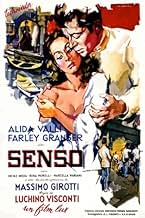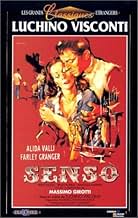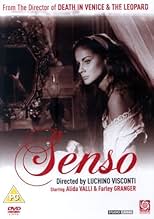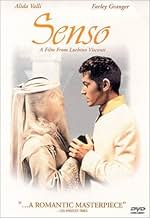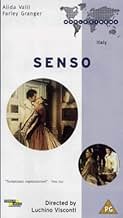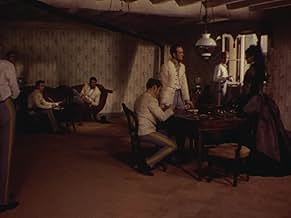ÉVALUATION IMDb
7,4/10
9,2 k
MA NOTE
Une comtesse italienne perturbée et névrosée trahit le pays tout entier pour une histoire d'amour autodestructrice avec un lieutenant autrichien.Une comtesse italienne perturbée et névrosée trahit le pays tout entier pour une histoire d'amour autodestructrice avec un lieutenant autrichien.Une comtesse italienne perturbée et névrosée trahit le pays tout entier pour une histoire d'amour autodestructrice avec un lieutenant autrichien.
- Prix
- 3 victoires et 2 nominations au total
Franco Arcalli
- Un soldato
- (uncredited)
Aldo Bajocchi
- Un soldato
- (uncredited)
Ottone Candiani
- Un soldato
- (uncredited)
Nando Cicero
- Un soldato
- (uncredited)
Claudio Coppetti
- Un soldato
- (uncredited)
Cristoforo De Hartungen
- Il generale Hauptmann
- (uncredited)
Tony Di Mitri
- Un soldato
- (uncredited)
Avis en vedette
Wonderful movie, and quite unexpected at the time from the neorealist Visconti, finally letting some of the operatic juice flow into his film work. It's also the first of his explorations of Italian history and social change, to be followed by The Leopard and the fantastic Rocco and His Brothers.
One caveat: At a screening a couple of years ago at MoMA, I learned that it was the Italian government that was responsible for the snipping of some crucial scenes near the end of Senso, depicting the Battle of Custozza. These were meant to make his critique of the Italian ruling classes and their failure to pull together during this period of the risorgimento more explicit. But apparently the Italian government, fresh from defeat in WW II, didn't like the idea of a major movie showing an Italian army being beaten. So the episode was truncated, leaving a few people scratching their heads about what the point of it all was. Poor Visconti tended to make long movies, and often had trouble getting them shown at the proper length in the US, but this time it was his own government that stymied him!
As for the rest: Granger is fine, but it's Valli who gives one of the all-time great move star performances. What a great face! The story is written on it, and the director wisely keeps her the focus of attention.
One caveat: At a screening a couple of years ago at MoMA, I learned that it was the Italian government that was responsible for the snipping of some crucial scenes near the end of Senso, depicting the Battle of Custozza. These were meant to make his critique of the Italian ruling classes and their failure to pull together during this period of the risorgimento more explicit. But apparently the Italian government, fresh from defeat in WW II, didn't like the idea of a major movie showing an Italian army being beaten. So the episode was truncated, leaving a few people scratching their heads about what the point of it all was. Poor Visconti tended to make long movies, and often had trouble getting them shown at the proper length in the US, but this time it was his own government that stymied him!
As for the rest: Granger is fine, but it's Valli who gives one of the all-time great move star performances. What a great face! The story is written on it, and the director wisely keeps her the focus of attention.
This has to be one of my all time old favorite Romantic Motion Picture.
Visconti brings about Magic and beauty onscreen making every shot a glamour in experience!
There are so many great moments in Senso that it will take you ages before this Picture wears out in your memory.
Besides the fact that Visconti is one of the great Film-makers of all times it has to be said that this Director simply had a feel about shots to form a scene to imprint that exact emotion or feeling that was intended by him. He always knew to capture and captivate the viewer and bring about that special bond which nowadays we have lost with contemporary Motion Pictures!
For all out there whom enjoy the Art of Film-making, for all whom cherish good Film-making, go fetch "Senso"! It's an experience not to forget!
Senso is about the magic which comes about when a Picture finds it's way through the Projector unto the White screen! It's an experience rarely seen but so is this Art which is only understood by a handful of Film-makers!
Luchino Visconti, I thank you for this venture and understanding of the greatest Art form in this Universe!
Visconti brings about Magic and beauty onscreen making every shot a glamour in experience!
There are so many great moments in Senso that it will take you ages before this Picture wears out in your memory.
Besides the fact that Visconti is one of the great Film-makers of all times it has to be said that this Director simply had a feel about shots to form a scene to imprint that exact emotion or feeling that was intended by him. He always knew to capture and captivate the viewer and bring about that special bond which nowadays we have lost with contemporary Motion Pictures!
For all out there whom enjoy the Art of Film-making, for all whom cherish good Film-making, go fetch "Senso"! It's an experience not to forget!
Senso is about the magic which comes about when a Picture finds it's way through the Projector unto the White screen! It's an experience rarely seen but so is this Art which is only understood by a handful of Film-makers!
Luchino Visconti, I thank you for this venture and understanding of the greatest Art form in this Universe!
Senso was Visconti at his most elegant and aesthetic. It opened his series of historical spectacles. The film showed that epics and melodramas can entail political criticism as any other genres. Senso is his intelligent analysis about the Italian unification - Risorgimento. The film's criticism didn't please all the people and it suffered from censorship and it was edited several times. Nonetheless this aesthetically beautiful film still stands out as a fine ironic masterpiece.
The year is 1866 and the moment people have dreamed for decades - centuries - is in our hands. Garibaldi is coming and the Italians are beating the Austrians. In the middle of all this Visconti tells us a story about an Italian woman, who is the cousin of the leader of the underground resistance, who falls in love with an Austrian lieutenant. She is blinded by her romantic illusion and is ready to betray her family, friends, ideals and native land - these are part of the ethical problematics in Senso.
Senso was Visconti's first color film and he obviously had put a lot of effort to it. It's visually gorgeous and meant an aesthetic revolution for Italian cinema. It is no coincidence that it starts in an opera which Visconti did a lot himself too. The opening sequence shows us the basic power of Opera and melodrama - to change life, infrastructure without forgetting the concrete history.
Historical films always tell us about two different ages, intentionally or unintentionally: the one the story takes place in and the time it was made in. It's a film about the Italian unification but also a study about the deepest emotions in Italy during the 1950's. Italy after WWII, filled with neo realism - antifascist battle and hope for democracy. But also about the downside; the victory of the right-wingers and the beginning of the Cold War.
Senso is a gorgeous film which requires patience and love from its viewer. It's a political, ironic, revolutionary and aesthetic film. Truly one of the biggest landmarks in Visconti's career but also in the history of Italian cinema.
The year is 1866 and the moment people have dreamed for decades - centuries - is in our hands. Garibaldi is coming and the Italians are beating the Austrians. In the middle of all this Visconti tells us a story about an Italian woman, who is the cousin of the leader of the underground resistance, who falls in love with an Austrian lieutenant. She is blinded by her romantic illusion and is ready to betray her family, friends, ideals and native land - these are part of the ethical problematics in Senso.
Senso was Visconti's first color film and he obviously had put a lot of effort to it. It's visually gorgeous and meant an aesthetic revolution for Italian cinema. It is no coincidence that it starts in an opera which Visconti did a lot himself too. The opening sequence shows us the basic power of Opera and melodrama - to change life, infrastructure without forgetting the concrete history.
Historical films always tell us about two different ages, intentionally or unintentionally: the one the story takes place in and the time it was made in. It's a film about the Italian unification but also a study about the deepest emotions in Italy during the 1950's. Italy after WWII, filled with neo realism - antifascist battle and hope for democracy. But also about the downside; the victory of the right-wingers and the beginning of the Cold War.
Senso is a gorgeous film which requires patience and love from its viewer. It's a political, ironic, revolutionary and aesthetic film. Truly one of the biggest landmarks in Visconti's career but also in the history of Italian cinema.
Whatever Anton Bruckner had in mind when writing his majestic Seventh Symphony, it probably wasn't as the score to a postwar Italian love story set during the Italian-Austrian conflicts of the Risorgiamento. Though the use of pre-existing classical music as backdrop for films is to be discouraged, here it works in surprising ways. Alida Valli is the Countess Livia Serpieri, in a loveless marriage to an older, collaborationist official. At the opera (Venice's La Fenice during Il Trovatore!) she meets up with a dashing young Austrian officer, Farley Granger. (Digression: After a handful of American films -- They Live by Night, Rope, Side Street, Strangers on a Train -- Granger journeyed to Italy to work with Visconti then fell off the screen for years, only to resurface in a few schlock films in the late 60s and early 70s. What happened to him?) They kindle up a clandestine and dangerous affair -- the wealthy older woman and the manipulative wastrel. After wheedling a small fortune out of her to bribe a doctor who declares him unfit to serve, he dumps her. But hell hath no fury....Luchino Visconti, assisted by the young Franco Zeffirelli -- both were opera directors, too -- pulls out all the stops, ending with a finale reminiscent of Tosca (but with a twist). Senso is a shameless and unforgettable wallow in Italianate passion -- unabashed verismo translated to the silver screen.
I have rated this film 9 because of it's length, there are some ponderous moments, but otherwise it is a 10. Italian cinema was still having growing pains from the war, but this epic succeeds, and skillfully incorporates the war torn landscape into this tale of an earlier war. The music score is very big and melodramatic, but fitting. The film opens with an opera in an enormous opera house, and this is fitting for the grand scale and operatic scope of this romance and the background. This is "Gone With the Wind" - Italian style - with a much more sympathetic heroine.
I am a fan of Alida Valli and have sought out her work. Perhaps because this is in her native Italian, and/or because of her Italian director, she is a full, vital, feminine woman in this film; very different from her more restrained work in America. (Her breathtaking performance in "The Paradine Case" is a study in austerity and an almost masculine stillness.) I had hoped that we would see a more free actress in her native language, and we do! She flutters and tosses her hair, she is a Countess reveling in her earthy affair. This is a full bodied performance.
Farley Granger's performance, whether in response to Valli, or just given a really meaty bad-boy to play, is a total revelation. He is lusty and sexy, provocative, pouty and passionate. In one scene, he greets her by wordlessly grabbing her hand and almost devouring it with kisses. This is a rare film where both the woman AND the man have real powerhouse roles. The confrontation scene at the end is gripping.
A small but pivotal role is played by Marcella Mariani. Her cow-like leadenness, laced with sisterhood, bespeaks a worldliness that, paired with her ethereal youthful beauty is just wrenching. All supporting roles, especially the maids, are interesting and give a sense of intrigue throughout.
A previous reviewer mentioned that the outcome of a major plot point is cut out, which leaves you wondering... "but what happened with that?" Still, the major story is the romance, which I think will be satisfying for men as well as women, because both sides are given such full emotional life. IF YOU CAN FIND IT, it is an enjoyable, big emotion, epic wartime romance.
I am a fan of Alida Valli and have sought out her work. Perhaps because this is in her native Italian, and/or because of her Italian director, she is a full, vital, feminine woman in this film; very different from her more restrained work in America. (Her breathtaking performance in "The Paradine Case" is a study in austerity and an almost masculine stillness.) I had hoped that we would see a more free actress in her native language, and we do! She flutters and tosses her hair, she is a Countess reveling in her earthy affair. This is a full bodied performance.
Farley Granger's performance, whether in response to Valli, or just given a really meaty bad-boy to play, is a total revelation. He is lusty and sexy, provocative, pouty and passionate. In one scene, he greets her by wordlessly grabbing her hand and almost devouring it with kisses. This is a rare film where both the woman AND the man have real powerhouse roles. The confrontation scene at the end is gripping.
A small but pivotal role is played by Marcella Mariani. Her cow-like leadenness, laced with sisterhood, bespeaks a worldliness that, paired with her ethereal youthful beauty is just wrenching. All supporting roles, especially the maids, are interesting and give a sense of intrigue throughout.
A previous reviewer mentioned that the outcome of a major plot point is cut out, which leaves you wondering... "but what happened with that?" Still, the major story is the romance, which I think will be satisfying for men as well as women, because both sides are given such full emotional life. IF YOU CAN FIND IT, it is an enjoyable, big emotion, epic wartime romance.
Le saviez-vous
- AnecdotesThe film opens in La Fenice, the Venice opera house. La Fenice was destroyed by arson in 1996, but reopened in 2003. Enlarged frames of this movie were used as a reference in reconstructing it.
- Citations
Il tenente Franz Mahler: It's too late! It's over! I'm not your romantic hero!
- Autres versionsTwo versions of the film are available on video.
- One version is missing the scene where Livia tries to explain where all the money meant for the troops went.
- Another version is missing the climatic battle sequence between the Austrian and Italian troops.
- ConnexionsEdited into Histoire(s) du cinéma: La monnaie de l'absolu (1999)
- Bandes originalesSinfonia N. 7 in mi maggiore (7th Symphony)
Music by Anton Bruckner
Performed by Orchestra Sinfonica Nazionale della Rai
Conducted by Franco Ferrara
Meilleurs choix
Connectez-vous pour évaluer et surveiller les recommandations personnalisées
- How long is Senso?Propulsé par Alexa
Détails
Box-office
- Budget
- 700 000 000 ₤IT (estimation)
- Brut – États-Unis et Canada
- 27 723 $ US
- Fin de semaine d'ouverture – États-Unis et Canada
- 3 984 $ US
- 28 oct. 2018
- Brut – à l'échelle mondiale
- 27 723 $ US
- Durée2 heures 3 minutes
- Couleur
Contribuer à cette page
Suggérer une modification ou ajouter du contenu manquant

Lacune principale
By what name was Senso - J'ai tué mon amour (1954) officially released in India in English?
Répondre
![Regarder Trailer originale italiano [OV]](https://m.media-amazon.com/images/M/MV5BYzc0Y2MyOGMtMzg0My00Mzc4LWIwYjItZjg1ZDhmMDZmOTlkXkEyXkFqcGdeQXRodW1ibmFpbC1pbml0aWFsaXplcg@@._V1_QL75_UX500_CR0)

